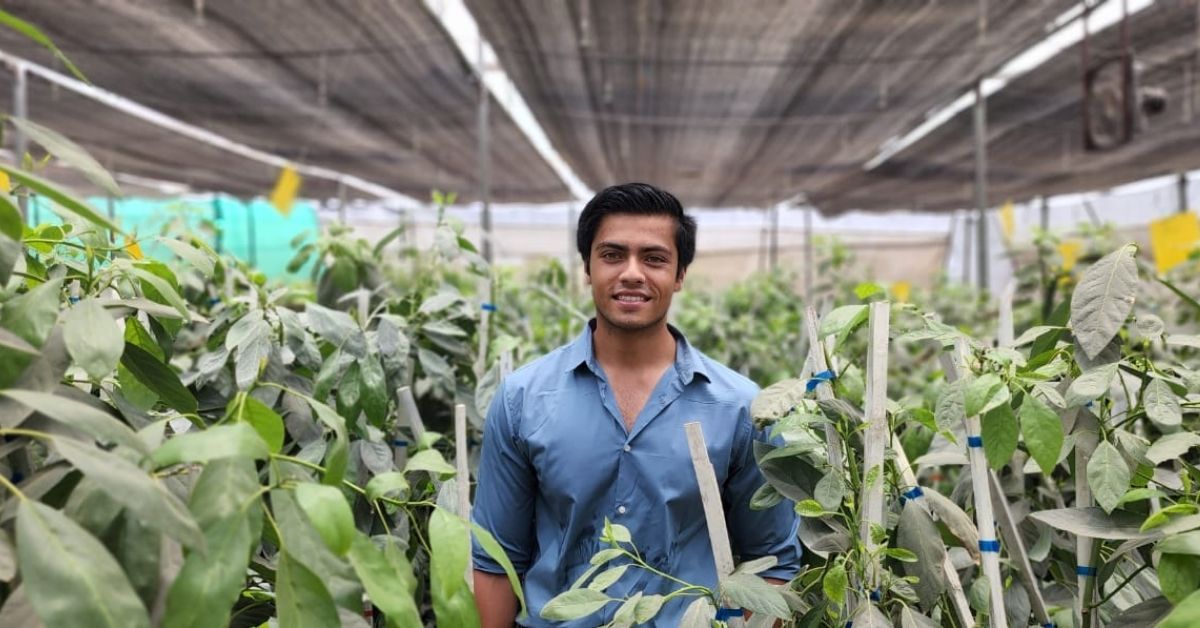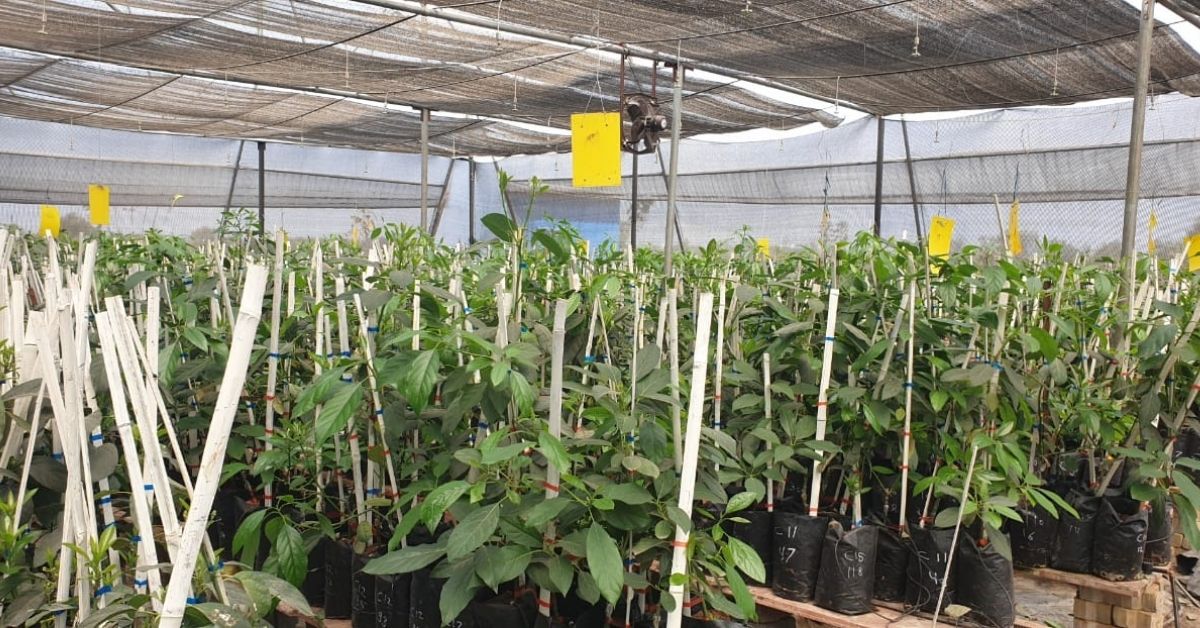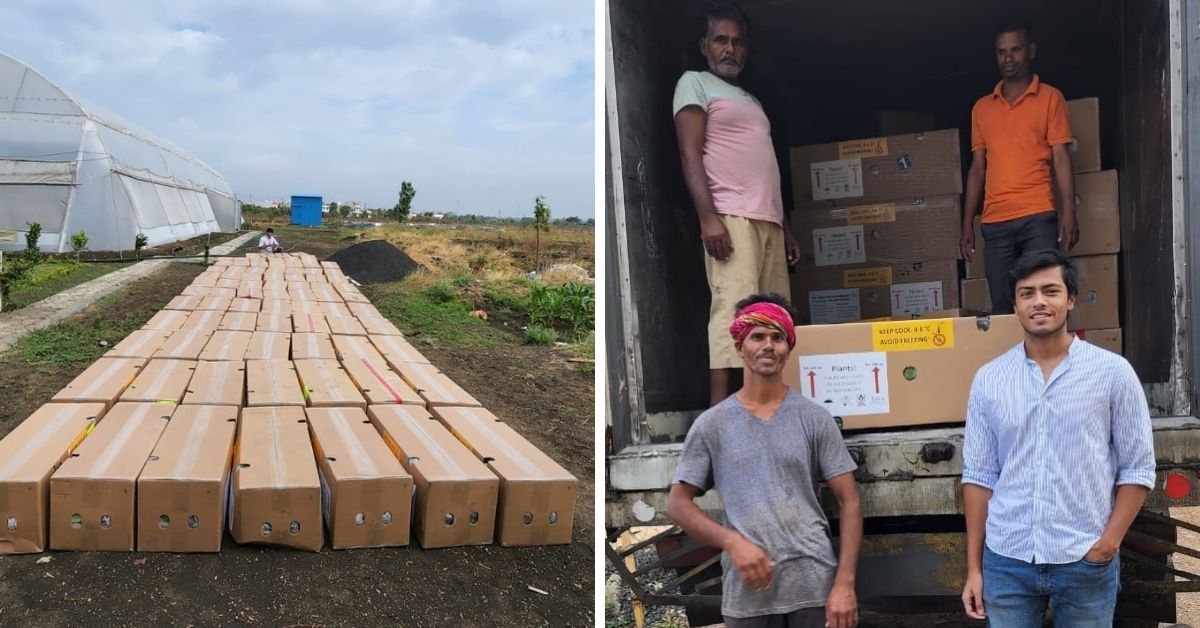Armed With UK Degree, Bhopal Boy Aims to Power an Avocado Farming Revolution
When 26-year-old Harshit Godha didn’t find quality avocados in Bhopal, he decided to study all about the fruit’s farming in other countries and grow them in abundance in India.

While pursuing a Bachelors in Business Administration (BBA) from England’s Bath University, an important part of Harshit Godha’s day was eating avocado.
As a fitness enthusiast, he made it a point to include the super food in his diet on a frequent basis. “Whenever I’d come back to India for summer vacations, I would notice that you don’t get good quality avocados here, especially in Bhopal,” he tells The Better India.
Back in the UK, he chanced upon the avocado packaging, which informed him that these were sourced from Israel. “It struck me that if Israel can grow avocados in such hot climate, we can do it in India too.” So in 2017, during the last semester of his BBA, Harshit had made up his mind to take up agriculture.
The result is a lush 5-acre farm where he grows about 1,800 avocados plants, as well as a nursery where he grows an additional 4,000 saplings. With these plants, he intends to create an orchard, and will sell the fruits three years from now. Meanwhile, he adds, the saplings in his nursery will be exported across India by next year.
The student gets a crash course
When Harshit entered the field of agriculture, he was on a mission to learn everything about avocado farming in Israel.
He started by sending cold emails to the Israeli avocado industry, asking if he could visit and learn from them. Soon, one farmer, Benny Weiss from Kibbutz Maagan, invited him to his farm. Today, Benny is still Harshit’s mentor.
During one of his summer breaks, Harshit visited Israel for a month on a tourist visa. Although this meant he couldn’t work, every morning between 5 am and 10 am he went to the farm, and took rigorous notes about the things they were doing. These included the varieties of avocado they planted, how the plants were laid out on the fields, the things you needed to keep in mind before cultivating avocados, how Israel is doing things differently from South America where the fruit is originally from, and more.
After 10 am, Benny would take him to speak with different avocado experts of Israel, from farmers to marketing professionals and irrigation experts. They would discuss how avocados are doing in Israel and the scope of the superfood in India.
He then returned to the UK to complete his degree. Now back in India, Harshit continues educating himself by interviewing avocado experts from all over the world, including Mexico, Australia, Columbia, and more. “I have a YouTube channel and a video podcast where I show these videos. I’m documenting my entire journey.”
The life of a farmer
Now back in India and armed with the necessary knowledge, five acres of family land in Bhopal, and his family’s full support, he was ready to grow avocados. To prepare the land, he invited his mentor and a supplier to India. “They both looked at multiple locations of my farm, and then decided upon one farm land.”
They conducted a soil texture test which determined that the land was equipped to grow avocados — however, the soil had to be raised. “You elevate the portion of the farm where you will plant the tree, because it’s black cotton soil and it absorbs a lot of water. And during the monsoon, raised soil ensures the plant won’t be waterlogged.” Most of the water will instead flow sideways from the ridges and away from the land, preventing water accumulation, he adds.
After the test, he now had to source avocado plants from Israel, with the aim of further growing them himself. But in 2019, he couldn’t get it imported. “The procedure is very hard for first timers. You have to figure out different licences and permits.” In 2020, COVID had put both countries in lockdown, and once again, he couldn’t source his plants. After more delays, he finally got his consignment of 1,800 plants in July 2021.
“These plants are all imported from Israel, and are specific varieties that were developed there.”

With the advice of his mentor, he decided to grow five different varieties of avocado across the five acres. These include the Hass, which is the dominant variety and most in demand by markets and Pinkerton, a variety suitable for higher temperatures than Hass grows in.
Through his experiments Harshit aims to figure out which variety grows best in India. “Because we don’t have actual data of what works in India, we can only judge by what has worked across the world on different continents. For instance, South America, the largest producer of avocados in the world, mostly grows Hass. Their weather conditions are naturally very ideal so they don’t even need to put in a lot of work. They plant a tree and it grows well.”
In India, the growing practices can’t be modelled exactly like any Western countries, he notes. “They have very machine focused and equipment heavy practices, because labour is expensive and it’s more feasible for them to use machines.” India can instead follow the models of Kenya, Uganda, or Tanzania, he opines. “They have cheap labour, similar to India.” So while he’s borrowing some practices from Israel, he’s relying mostly on the model of Kenya.
Documenting the entire journey online has led to several enquiries about the plant and its cultivation. On 19 June, he imported another consignment of 4,000 plants of the same five varieties, that he is now growing himself.
These have to be irrigated throughout the year, even during the monsoon season. “We have to use fertilisers. You can’t just fertilise the plants once every couple of months and leave it. You have to fertilise them with each irrigation cycle, which is every alternate day or every month.” This ensures better height and maximum yield, he adds.
While delivery of these saplings is scheduled for next year, he has sold out all orders, he says. His buyers are from all over the country, including Kodaikanal, Assam, Arunachal Pradesh, Sikkim, Nagaland, Gujarat, Maharashtra, and more.
Harshit explains that the plants have to be quarantined for a year. “When you import plants, the government makes sure you don’t accidentally import any disease, pest, or fungus along with it. So my nursery is actually a quarantine facility.” He adds that the facility is frequently inspected by the government, which makes sure nothing unwanted has entered the country.
“I need that one year anyway because the plants I import are quite young. They’re not ready for transplanting onto the field yet,” he says. After planting, these will take three years to bear fruit. Harshit has invested about Rs 50 lakh, taken from his family, for the entire setup.
“Locations like North East India and the coffee estates of South India are more suitable for Hass, because the temperature here doesn’t go above 35 degrees celsius. For green-skinned avocados, which can tolerate temperatures up to 42 or 43 degrees, we have states like Madhya Pradesh, Punjab, Gujarat, where temperatures are high but not extremely high.”
“Sometimes it feels challenging, because it’s a new field, it’s uncharted territory,” he says. “But I’m still learning what will and won’t work, especially since climatic conditions differ all over the country.”
Above all, Harshit is excited about the work he’s doing. “I’m developing a new niche in the agricultural industry in India,” he opines.
Learn more about his work through his website.
Read this story in Hindi here.
Edited by Divya Sethu
This story made me
- 97
- 121
- 89
- 167
Tell Us More
We bring stories straight from the heart of India, to inspire millions and create a wave of impact. Our positive movement is growing bigger everyday, and we would love for you to join it.
Please contribute whatever you can, every little penny helps our team in bringing you more stories that support dreams and spread hope.



















